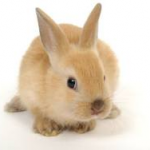 There are many myths and misconceptions about domestic rabbits that give people preconceived ideas about how these animals should behave as pets. When the rabbit does not live up to these expectations, the owner becomes frustrated and the rabbit is often abandoned. It is estimated by the ASPCA that approximately 80% of all pet rabbits find themselves homeless at some point in their lives. To help prevent this tragedy, it is essential that rabbit owners understand their rabbit’s basic needs, instincts and behaviours. Being aware of misconceptions and accepting your rabbit for what he is will make you and your rabbit much happier.
There are many myths and misconceptions about domestic rabbits that give people preconceived ideas about how these animals should behave as pets. When the rabbit does not live up to these expectations, the owner becomes frustrated and the rabbit is often abandoned. It is estimated by the ASPCA that approximately 80% of all pet rabbits find themselves homeless at some point in their lives. To help prevent this tragedy, it is essential that rabbit owners understand their rabbit’s basic needs, instincts and behaviours. Being aware of misconceptions and accepting your rabbit for what he is will make you and your rabbit much happier.
Don’t be fooled by the following myths:
Myth: Rabbits are low maintenance pets.
We often hear: “We really want a dog, but they are too much work, so we are thinking of a rabbit”. In reality, rabbits require as much work as a cat or dog. They require fresh food and water daily, clean cages and litter boxes, and lots of love and attention from their owners. In addition, rabbits require daily exercise and out of cage time in a “bunny-proofed” area for their mental and physical well-being. If you plan to keep your rabbit in a cage all of the time, you will have a very sad, bored and depressed rabbit who will, in turn, become a boring pet. Remember, you will only get out of your relationship with our pet rabbit what you are willing to put into it.
More information: Bunny-Proofing, Diet
Myth: Rabbits are ideal starter pets for children.
It is a common misconception that providing a child with a pet to care for will teach responsibility. In reality, however, most young children are not ready for the responsibility of caring for a pet and older children are often too busy with homework and extra curricular activities to properly care for a rabbit. Within weeks of bringing the rabbit home, children may lose interest or forget to feed the rabbit and clean the cage regularly. The rabbit’s care then becomes the parents’ responsibility. With busy family schedules, most parents become resentful of the additional workload and give the rabbit away. Instead of teaching responsibility, the child learns how easy it is to dispose of one’s responsibilities. Do not get a rabbit unless it will be a pet for the entire family and an adult will be the primary caregiver.
More information: Is a pet rabbit right for your child?
Myth: Rabbits like to be picked up and cuddled.
Rabbits are often portrayed in children’s books as being cuddly and docile. While some rabbits certainly enjoy spending time with their owners, most do not like to be held or carried. Because of the rabbit’s delicate skeletal structure and the fact that it may bite, nip or scratch as a defense to remove itself from a situation, holding a rabbit against its will may result in injury to both the handler and the rabbit.
Myth: It doesn’t cost much to care for a pet rabbit.
Do not get a rabbit because you think it will be an inexpensive pet or if you do not plan to provide necessary medical care. While rabbits do not require yearly vaccinations, they should receive regular check-ups and be spayed or neutered by a veterinarian who specializes in exotic pets. Finding a vet who has experience with rabbits can be difficult, and depending on the illness and required treatment, vet bills can be as costly as owning a dog or cat.
More information: Diet, Spaying and Neutering, Health
Myth: Rabbits do not live long.
Rabbits have a lifespan of 8-14 years, making them a long-term commitment.Parents with teenage children who wish to acquire a rabbit should consider the fact that the rabbit may still be living when your children are ready to go off to college. It would be unfair to re-home an older rabbit that has been your pet for many years simply because your children have left home. Do not get a rabbit if you are looking for a short-term commitment.
Myth: Rabbits are smelly animals.
Rabbits are very clean animals and can be easily litter-trained.They like to live in a clean environment and rely on their owners to regularly clean their litter boxes and cages. Unaltered rabbits may have stronger smelling urine than their altered counterparts, but if a rabbit’s area has an unpleasant odour, it is generally because its cage or litter box is not cleaned regularly or the litter that is being used is not very absorbent. To minimize odour, it’s very important to use an absorbent litter product such as Yesterday’s News or Carefresh and clean your rabbit’s area regularly.
More information: Litter training.
Myth: Rabbits should be housed outside as nature intended.
Domestic rabbits do not do fare well in extreme cold, heat or wet conditions. Even in temperate climates, predators such as cats, dogs, raccoons, skunks and hawks pose a threat and can easily kill an outdoor rabbit simply by approaching its hutch. Rabbits living outdoors are also more susceptible to fly-strike. However, most of all, rabbits that are housed outside do not receive the same socialization, companionship and attention from their owners as those housed indoors.
More information: Housing, Litter training, Bunny-Proofing
Myth: Because of their small size, dwarf rabbits make the best pets.
Rabbits are bred to look a certain way, not for behaviour or personality traits. Generally, it is thought that small breeds tend to be more active and adventurous and larger breeds tend to be more laid-back and docile. However, the more rabbits we meet, the more we realize that every rabbit is truly unique in its own way.
Housing accommodations for smaller breeds may require less floor space, but housing should not be your only consideration when choosing a rabbit. Every rabbit needs cage large enough to hold a litter box, toys, food and water containers and allow space for the rabbit to stretch out and stand up on its back legs.
More information: Housing
Myth: It is easier to bond siblings than two unrelated rabbits, especially if they are different sizes and breeds.
It is true that siblings, if housed together as babies, will likely get along well. However, as the pair reaches sexual maturity, many will start to fight causing serious wounds to one another. In addition, because it is difficult to accurately assess the gender of young rabbits and rabbits can reproduce at a very young age (as young as12 – 13 weeks), accidental litters are common. The keys to a good match are personality and having both rabbits altered, while size and breed have no bearing on the bond.
More information: Bonding
Myth: If you acquire a rabbit as a baby, it will more likely bond to you and be friendlier as an adult.
Babies are generally more interested in exploring their environment than bonding with their owner. In addition, babies grow up quickly and upon reaching sexual maturity, may become aggressive or protective of their space. Getting a rabbit as a baby does not guarantee a friendly adult rabbit.
Myth: Older or second-hand rabbits are aggressive and untrainable.
Many rabbits are re-homed through no fault of their own. This does not make them ‘bad’ rabbits. Even those that have been re-homed several times can still bond to a new owner and display signs of trust and affection. It can be very rewarding to adopt a rabbit and give him a second chance for a happy life.

